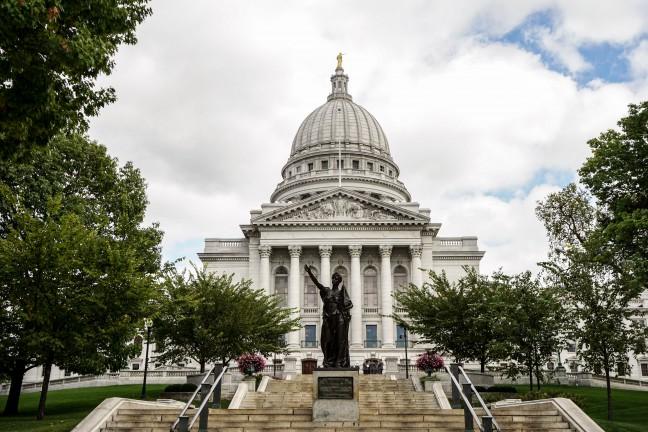Wisconsin Gov. Tony Evers vetoed 43 Republican-backed bills following the end of the legislative session, which covered Republican priorities like election administration and COVID-19 policies.
Evers vetoed nine bills that, if passed, would have changed election laws in Wisconsin and restricted voting, according to AP News.
“The right to vote is fundamental to our democracy; it should not be subject to the whim of politicians who do not like the outcome of an election,” Evers said in a veto message.
Republicans across the country have attempted to tighten voting laws after President Donald Trump’s election loss sparked widespread claims of voter fraud, according to Five Thirty Eight. Many such bills attempt to limit mail-in voting, strengthen voter ID laws and eliminate automatic and same-day voter registration, according to The Skimm.
Absentee drop boxes will not be allowed in Wisconsin spring election
In alignment with this nationwide trend, Wisconsin Senate Bill 939 would have made it more difficult to apply for and receive an absentee ballot, Evers said in his veto message.
The bill would have put restrictions on voters automatically receiving absentee ballots and implemented new requirements to obtain an absentee ballot, according to Wisconsin State Legislature. But these changes were unnecessary, complicating an already-functioning process, Evers argued in his veto explanation.
The bill would also prohibit the long-standing practice of clerks correcting minor ballot defects on an absentee ballot, according to Wisconsin State Legislature. This means ballots with misprinted zip codes or forgotten house numbers would be discarded.
Evers said he believes a voter’s ballot should not be invalidated for such small mistakes. But State Sen. Kathleen Bernier, R-Chippewa Falls, thinks Evers vetoed the bills to support his own political party. Bernier said Evers’ vetos are an extension of the political polarization that characterizes Wisconsin and the rest of the country.
Evers to hold special session to address Wisconsin’s labor shortage
“The goal was to refer to every Republican election bill as voter suppression,” Bernier said. “Tony Evers vetoed all these bills because it will help his base, meaning the Democratic base.”
Democrats and Republicans are more divided now than at any point in the last two decades, and partisan animosity has increased substantially in recent years, according to the Pew Research Center.
Despite increasing polarization, League of Women Voters of Wisconsin’s Executive Director Debra Cronmiller said Evers’ vetoes aim to ensure the efficiency and accessibility of future elections.
Wisconsin abortion laws to be under the microscope in 2022 gubernatorial election
“Gov. Evers was right to veto several restrictive voting bills passed this spring by the legislature because they would make it much harder for many people to vote while doing nothing to improve elections,” Cronmiller said.
Evers also vetoed multiple assembly bills pertaining to COVID-19 masking and vaccines. Assembly Bill 995 would have prohibited school board districts and their employees from requiring students to wear masks in school. Similarly, Assembly Bill 675 would mandate that employers who require proof of vaccine against COVID-19 must accept documentation showing natural immunity against the disease instead.
But Evers said he does want legislature interfering with decisions that schools have already made at the district level, nor did he want policies that contradicted science, he said in veto messages.
Green Party candidate denied from Wisconsin general election ballot
Evers also vetoed three gun bills that would have extended the right to carry concealed weapons in Wisconsin.
If passed, Assembly Bill 495 would have weakened current concealed-carry weapon license regulations and in some circumstances, allowed licensees to possess a loaded firearm on school grounds. Assembly Bill 597 aimed to allow those licensed to carry a concealed weapon to possess a firearm in a place of worship located on the grounds of a private school.
Finally, Assembly Bill 518 would have expanded concealed carry reciprocity and allowed those licensed in other states to carry concealed weapons in Wisconsin. This would allow any person with a permit to carry a concealed weapon in Wisconsin, regardless if the qualifications for said permit match, according to United States Concealed Carry Association.
Former Wisconsin Supreme Court Justice wants to jail Madison mayor, nine others
The Wisconsin Anti-Violence Effort supported Evers’ decision on this gun legislation, WAVE Program Director Heidi Rose said.
“Any effort to bring more firearms on school grounds or in school settings is not going to help keep students safe,” Rose said. “This particular group of legislation would expand access to firearms, which goes against what we know will keep people safe and also the wishes of the majority of the people in Wisconsin.”
Finally, Evers vetoed Assembly Bill 884, which would have mandated the University of Wisconsin System to accept a course in the Bill of Rights or the U.S. Constitution to satisfy the general education ethnic studies requirement.
Since 1989, all University of Wisconsin-Madison students have been required to take a three-credit ethnic studies course before graduating.
BREAKING: Evers announces in-state tuition freeze, mental health investment for UW System campuses
“This Legislature must stop using our students as political pawns,” Evers said in his veto message. “Educators should be able to teach honest, complete facts about important historical topics and events, and our students deserve to learn in atmospheres conducive to learning without being subjected to political interference by the Legislature.”
Many of the bills Evers vetoed passed with few or no votes from Democrats in the legislature.














